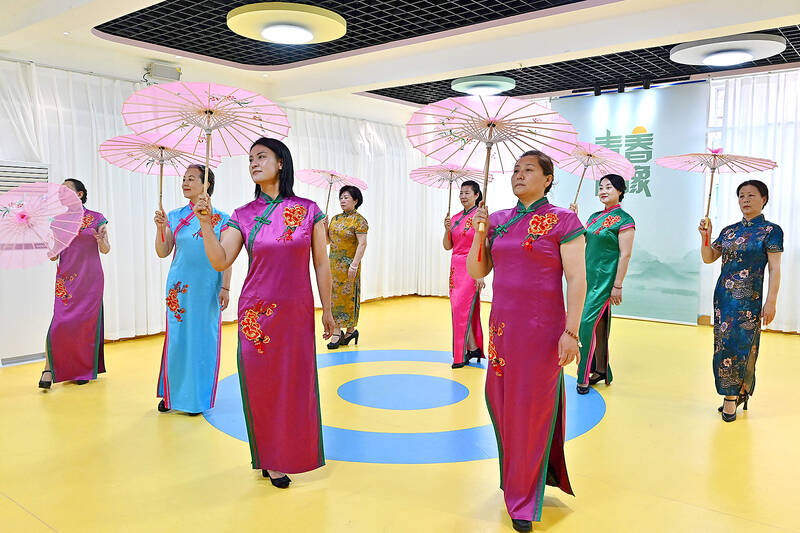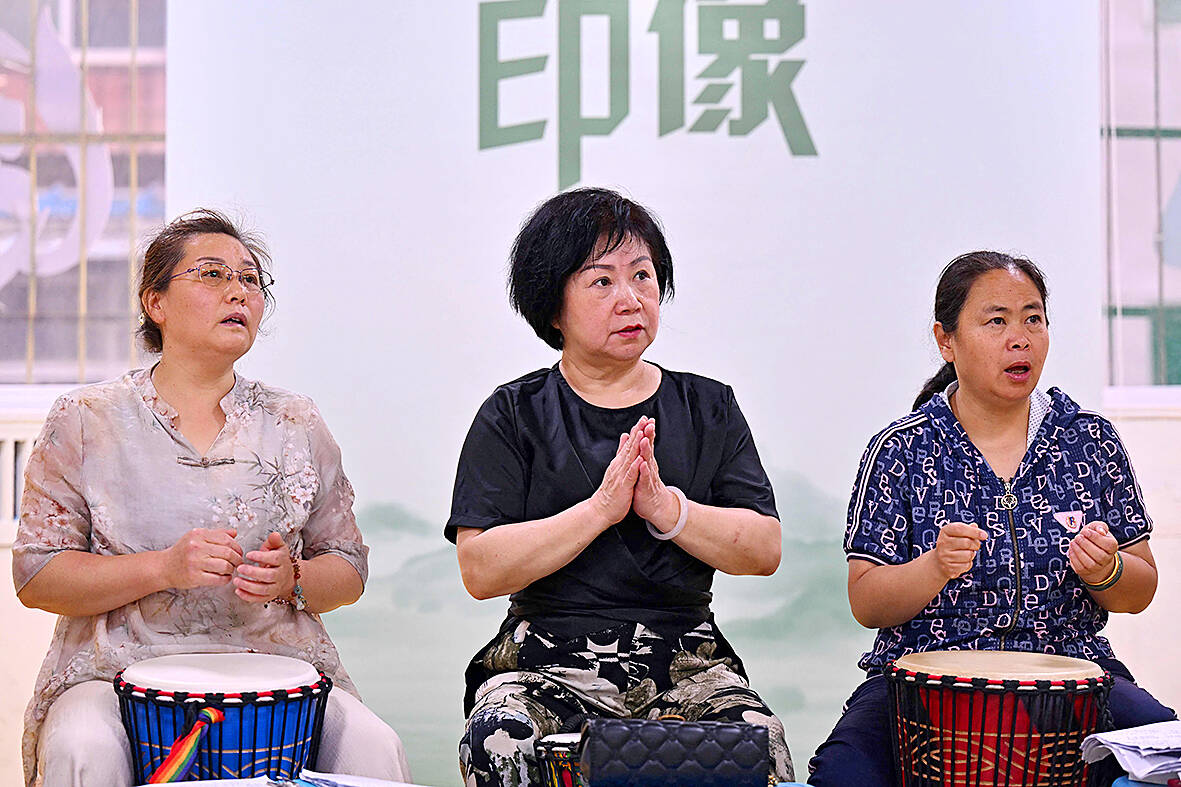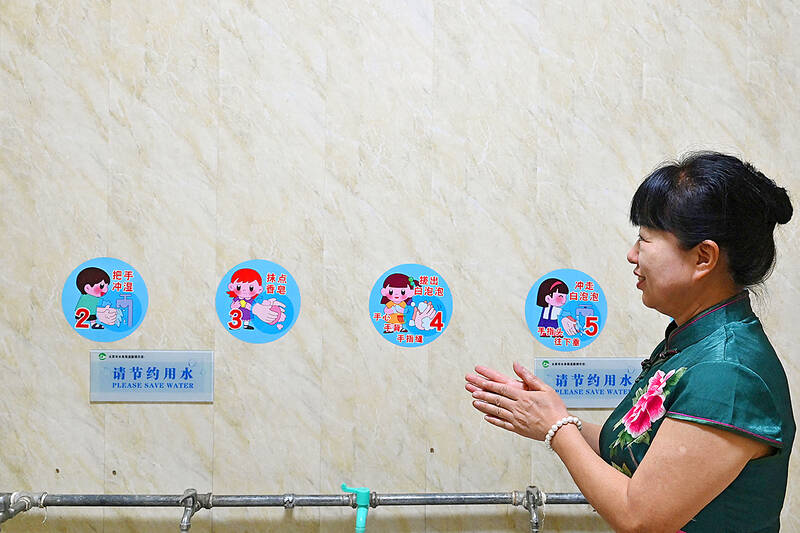Senior citizens sway to old-time tunes at a former kindergarten in northern China, as educators turn their sights away from children in the face of a rapidly aging population and a baby bust.
Hundreds of millions of Chinese are set to enter old age in the coming decades while the country’s chronically low birth rate leaves ever fewer people to replace them, official statistics show.
The crisis is already hitting the education sector, with thousands of preschools closing around the country as enrollments dry up.

Photo: AFP
But others are changing with the times — such as a facility in Shanxi province, which has traded chortling children for a more mature cohort.
“[The problem] became particularly evident as the number of children continued to decrease,” said principal Li Xiuling, 56. “After my kindergarten emptied out, I thought about how to make the best use of it,” she added.
Li’s preschool was founded in 2005 and once served as many as 280 children, but closed last year.

Photo: AFP
It reopened in December as Impressions of Youth, a recreational center for people of retirement age and above.
The space in the provincial capital Taiyuan boasts around 100 adult learners of music, dance, modeling and other subjects.
“It’s quite a progressive idea,” Li said. “They come to fulfill some of the dreams they had when they were young.”

Photo: AFP
‘I’M YOUNG AGAIN’
On a rainy morning this month, a modeling instructor led a line of immaculately coiffed older women as they sashayed around the classroom in traditional cheongsam dresses and pink oil-paper parasols.
In another class, students sat in a semicircle beating African drums in time to soaring socialist songs.
He Ying, 63, said joining the center had helped her overcome a post-retirement lack of confidence and meet new friends.
“I used to feel that my cultural life... was very impoverished, that there wasn’t much meaning in going on living,” she said.
“(People here) are not just waiting to grow old.”
Nearly 15,000 kindergartens closed in China last year as enrollments plunged by 5.3 million compared to 2022, according to government data.
In dusty, industrial Shanxi — where the overall population is falling — there were 78,000 more deaths than births last year.
The center bears traces of its past, with bunkbeds and dinky writing desks lining the colorfully decorated walls of former classrooms.
For Yan Xi, who used to teach at the kindergarten but now leads classes for retirees, the shift has taken some getting used to.
“Little kids just believe whatever you say, but the elderly... have their own ways,” she said.
“I have to think harder about how to communicate with them,” Yan said.
Several other facilities across China have found success by pivoting from preschool to senior education, according to local news reports.
Student Sun Linzhi, 56, said they met “a need for universities for the elderly.”
Since joining the center in Taiyuan, “I feel like I’m young again,” she said.
‘SILVER ECONOMY’
China saw a significant rise in the senior population last year, adding nearly 17 million people aged 60 and above, according to official statistics.
That age group already makes up more than 20 percent of the population, a proportion that is expected to rise to nearly a third by 2035, according to the Economist Intelligence Unit, a research group.
Beijing plans to introduce a “relatively sound” national elderly care system by next year, but the country lacks nursing homes and faces wide regional disparities in coverage.
Top leaders will likely discuss the future of what they call the “silver economy” at a key economic meeting in the capital next week.
The government estimates that products and services catering to the elderly — from senior-friendly tourism to technology-driven medical care — could be worth 30 trillion yuan (US$4.13 trillion) by 2035.
But it has struggled to revive the plummeting birth rate, a major driver of China’s mismatched demographics.
Li, the principal, said she felt nostalgic for the days when her school teemed with boisterous kids.
“I was very emotionally invested in it,” she said, gesturing towards the disused bunks and desks.
“We kept those as a kind of memento.”

June 2 to June 8 Taiwan’s woodcutters believe that if they see even one speck of red in their cooked rice, no matter how small, an accident is going to happen. Peng Chin-tian (彭錦田) swears that this has proven to be true at every stop during his decades-long career in the logging industry. Along with mining, timber harvesting was once considered the most dangerous profession in Taiwan. Not only were mishaps common during all stages of processing, it was difficult to transport the injured to get medical treatment. Many died during the arduous journey. Peng recounts some of his accidents in

“Why does Taiwan identity decline?”a group of researchers lead by University of Nevada political scientist Austin Wang (王宏恩) asked in a recent paper. After all, it is not difficult to explain the rise in Taiwanese identity after the early 1990s. But no model predicted its decline during the 2016-2018 period, they say. After testing various alternative explanations, Wang et al argue that the fall-off in Taiwanese identity during that period is related to voter hedging based on the performance of the Democratic Progressive Party (DPP). Since the DPP is perceived as the guardian of Taiwan identity, when it performs well,

The Taiwan People’s Party (TPP) on May 18 held a rally in Taichung to mark the anniversary of President William Lai’s (賴清德) inauguration on May 20. The title of the rally could be loosely translated to “May 18 recall fraudulent goods” (518退貨ㄌㄨㄚˋ!). Unlike in English, where the terms are the same, “recall” (退貨) in this context refers to product recalls due to damaged, defective or fraudulent merchandise, not the political recalls (罷免) currently dominating the headlines. I attended the rally to determine if the impression was correct that the TPP under party Chairman Huang Kuo-Chang (黃國昌) had little of a

At Computex 2025, Nvidia CEO Jensen Huang (黃仁勳) urged the government to subsidize AI. “All schools in Taiwan must integrate AI into their curricula,” he declared. A few months earlier, he said, “If I were a student today, I’d immediately start using tools like ChatGPT, Gemini Pro and Grok to learn, write and accelerate my thinking.” Huang sees the AI-bullet train leaving the station. And as one of its drivers, he’s worried about youth not getting on board — bad for their careers, and bad for his workforce. As a semiconductor supply-chain powerhouse and AI hub wannabe, Taiwan is seeing